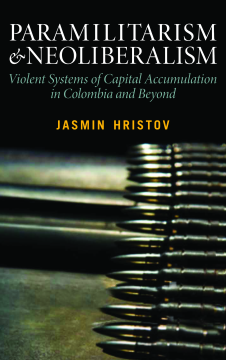
Additional Information
Book Details
Abstract
The people of Colombia have, for the last fifty years, been subject to a specific form of violence: paramilitarism. An embodiment of the dark underbelly of global capitalist accumulation, this form of pervasive violence expresses the exacerbation of social inequalities and class formation under capitalism. In Paramilitarism and Neoliberalism, Jasmin Hristov theorises this extreme expression in light of forced displacement, labour repression, subjugation of social movements, decentralisation of violence, drug trafficking and the emergence of a variety of para-institutional armed actors across Latin America.
The activities of paramilitary groups in the postdemobilisation era, their involvement in human rights violations, and their multilevel support networks inside major state institutions are documented, with a particular emphasis on violent dispossession and illegal land appropriation that has benefited agroindustries and mining enterprises. Hristov engages in a Marxist political economy approach, combined with a global sociological perspective, allowing for an expansive and deep-reaching understanding of paramilitarism as a phenomenon with many faces, ultimately illustrating how it is increasingly becoming the coercive counterpart of global capital.
'An urgent and elegant indictment of the paramilitary-capital-state nexus in contemporary Colombia, unveiled with precision and a mastery of the facts'
Jeffery R. Webber, Queen Mary University of London, author of Red October: Left-Indigenous Struggles in Modern Bolivia
'Very few books are able to penetrate the labyrinth of political development in Colombia and uncover the roots of the violence that has dominated the history of Colombia. This book does so with surprising agility, solid research and clear language. A must read for all those concerned and interested in political developments in Latin America'
Henry Veltmeyer, Universidad Autónoma de Zacatecas
This is the first study to provide a theoretical understanding of paramilitary violence as an instrument of neoliberal globalization. Hristov writes with great clarity, passion, and commitment
William I. Robinson, Professor of Sociology, University of California at Santa Barbara, Author of Global Capitalism and the Crisis of Humanity
Table of Contents
| Section Title | Page | Action | Price |
|---|---|---|---|
| Cover | Cover | ||
| Contents | vii | ||
| List of Tables | ix | ||
| List of Figures | x | ||
| List of Acronyms | xi | ||
| Acknowledgements | xvii | ||
| Preface | xviii | ||
| 1. Introduction: The Spectre of Paramilitarism | 1 | ||
| 2. Foundations for Theorizing Paramilitarism | 20 | ||
| 3. From Colonialism to Neoliberalism: A History of Dispossession | 61 | ||
| 4. Eight Years After the Demobilization of the AUC: The Predatory State-Capital Alliance of Domination (2006-2014) | 112 | ||
| 5. Paramiliarism, Neoliberalism and Globalization: Towards a New Analytical Framework | 138 | ||
| 6. Conclusion | 166 | ||
| Notes | 171 | ||
| References | 184 | ||
| Index | 205 |
